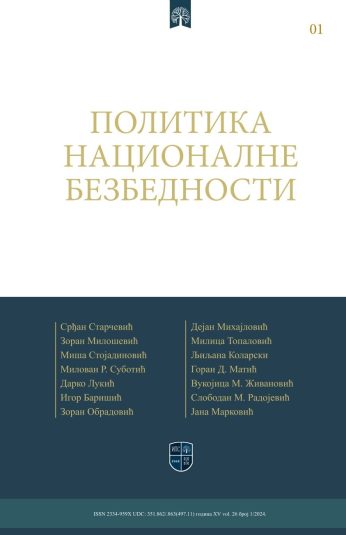Main topic
ARTICLES AND STUDIES
OVERSEEING SURVEILLANCE POWERS – THE CASES OF POLAND AND SLOVAKIA
Abstract
The article aims to present the most important issues related to oversight over surveillance powers in Poland and Slovakia. The word „surveillance powers” used in the study refers particularly to covert techniques and practices of gathering personal data which occurs without the monitored subjects’ knowledge or approval. Such surveillance powers are typically carried out by police services and intelligence agencies, and are more politically sensitive, as well as closely related to core issues of power and security. Oversight over these services and their surveillance powers is the standard in democratic states. Before 1989-1990, there was a similar model of security services in both analyzed countries. During Communism, there was no civil and democratic oversight over police services and intelligence agencies. Under the communist system control over security services was exercised by an inner circle representing the highest levels of the Communist party. Finally, since the early 1990s Poland and Slovakia had to build new systems of control and oversight over surveillance powers. Nowadays, both countries are members of the European Union and the Council of Europe. The basic issue of the paper is to describe how the systems of control and oversight look in Poland and Slovakia in the post-Snowden era.
References
- Aldrich, R. J. & D. Richterova. 2018. „Ambient accountability: intelligence services in Europe and the decline of state secrecy”. West European Politics, 41 (4): 1003-1024.
- Caparini, M. 2014. „Comparing the Democratization of Intelligence Governance in East Central Europe and the Balkans”. Intelligence and National Security, 29(4): 498-522.
- European Commission for Democracy through Law (Venice Commission). 2016. Opinion on the Act of 15 January 2016 amending the Police Act and certain other acts, Strasbourg, 13 June 2016 (Opinion no. 839/2016).
- European Union Agency for Fundamental Rights. 2017a. Surveillance by intelligence services: fundamental rights safeguards and remedies in the EU. Volume I: Member States’ legal frameworks, Luxembourg: Publications Office of the European Union.
- European Union Agency for Fundamental Rights. 2017b. Surveillance by intelligence services: fundamental rights safeguards ad remedies in the EU. Volume II: field perspectives and legal update, Luxembourg: Publications Office of the European Union.
- Gruszczak, A. 2009. „The Polish Intelligence Services”. In: Geheimdienste in Europa. Transformation, Kooperation und Kontrolle, eds. Т. Jäger, А. Daun, 126-151. Wiesbaden: FRG: VS Verlag für Sozialwissenschaften.
- Gruszczak, A. 2017. „The Polish intelligence services and security dilemmas of a frontline state”. Revista Română de Studii de Intelligence, 17-18: 65-80.
- Kadlečíkovává, J. & I. Rapošová. 2016. National intelligence authorities and surveillance in the EU: Fundamental rights safeguards and remedies: Slovak Republic, Version of 10 July 2016.
- Kolaszyński, M. 2017. „Constitutional status of Polish intelligence services since 1989: intelligence vs. the police”. Politeja: Global and regional security challenges, 50 (5): 213-225.
- Kolaszyński, M. 2018. „Intelligence Control and Oversight in Poland since 1989”. The International Journal of Intelligence, Security and Public Affairs, 20 (3): 230-251.
- Kolaszyński, M. 2019. „Surveillance Powers of Law Enforcement and Intelligence Services in Poland”. In: Security Outlook 2018, ed. A. Gruszczak, 127-141. Kraków: Księgarnia Akademicka.
- Kovanič, M. 2019. „Digital surveillance and privacy: battle for telecommunications metadata in Slovakia”. V4 Human Rights Review, 1 (1): 42-44.
- Kovanič, M. & А. Coufalova. 2020. „The legitimacy of intelligence surveillance: the fight against terrorism in the Czech Republic and Slovakia”, Intelligence and National Security, 35 (1): 115-130.
- Láštic, E. & М. Kovanič. 2017. „Surveillance in Post-communist Slovakia: Constitutional Law”. European Review of Public Laws, 29(3): 933-948.
- Medvecký, M. & Ј. Sivoš. 2016. „Slovakia: State Security and Intelligence since 1945”. In: Handbook of European Intelligence Cultures, eds. B. de Graaff, J. M. Nyce, 335-346. Lanham: Rowman & Littlefield.
- Persak K. & Ł. Kamiński (eds.). 2005. A Handbook of the Communist Security Apparatus in East Central Europe: 1944–1989. Warszawa: Institute of National Remembrance.
- Program Prawa i Sprawiedliwości 2014. Zdrowie. Praca. Rodzina. 2014. [The Party Program of the Law and Justice 2014. Health. Work. Family]: http://pis.org.pl/dokumenty
- Sarnecki, P. 2010. „Dostęp do akt dokumentujących działania podjęte przez służby specjalne” [Access to the files documenting activities taken by special services]. In: Regulamin Sejmu w opiniach Biura Analiz Sejmowych: Vol. 2, ed. W. Odrowąż-Sypniewski, 128-130. Warsaw: Wydawnictwo Sejmowe.
- Svenonius, O., F. Björklund & P. Waszkiewicz. 2014. „Surveillance, lustration and the open society: Poland and Eastern Europe”. In: Histories of State Surveillance in Europe and Beyond, eds. K. Boersma, R. Van Brakel, C. Fonio & P. Wagenaar, 95-117. London and New York: Routledge.
- Williams, K. & D. Deletant. 2001. Security Intelligence Services in New Democracies: The Czech Republic, Slovakia and Romania. London: Palgrave Macmillan UK.
- Završnik, A. 2013. „Blurring the Line between Law Enforcement and Intelligence: Sharpening the Gaze of Surveillance?”. Journal of Contemporary European Research, 9 (1): 181-202.
- Zybertowicz, A. 2007. „Transformation of the Polish Secret Services: From Authoritarian to Informal Power Networks”. In: Democratic Control of Intelligence Services. Containing Rogue Elephants, eds. H. Born & M. Caparini, 65-82. Hampshire and Burlington: Ashgate.

